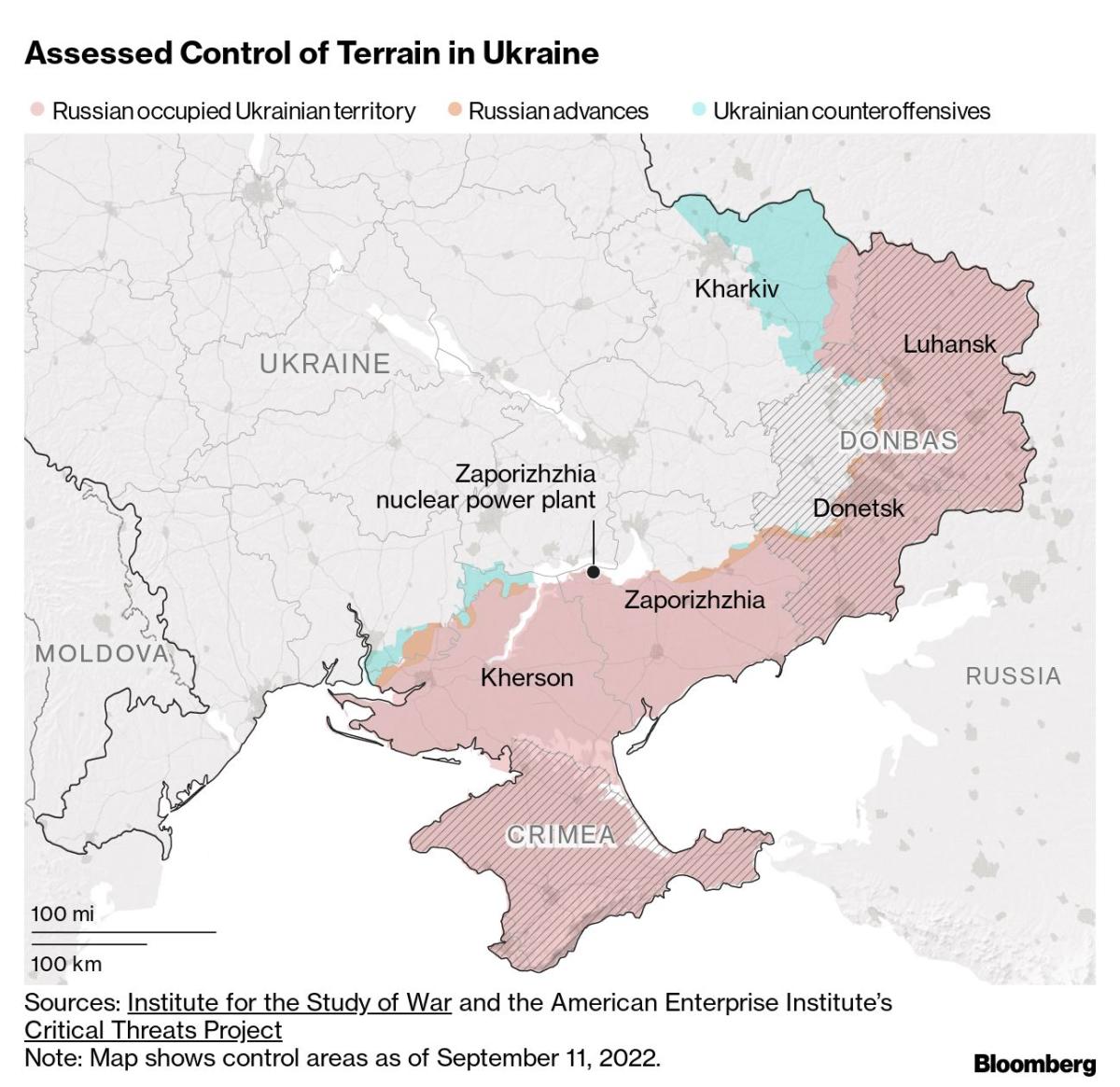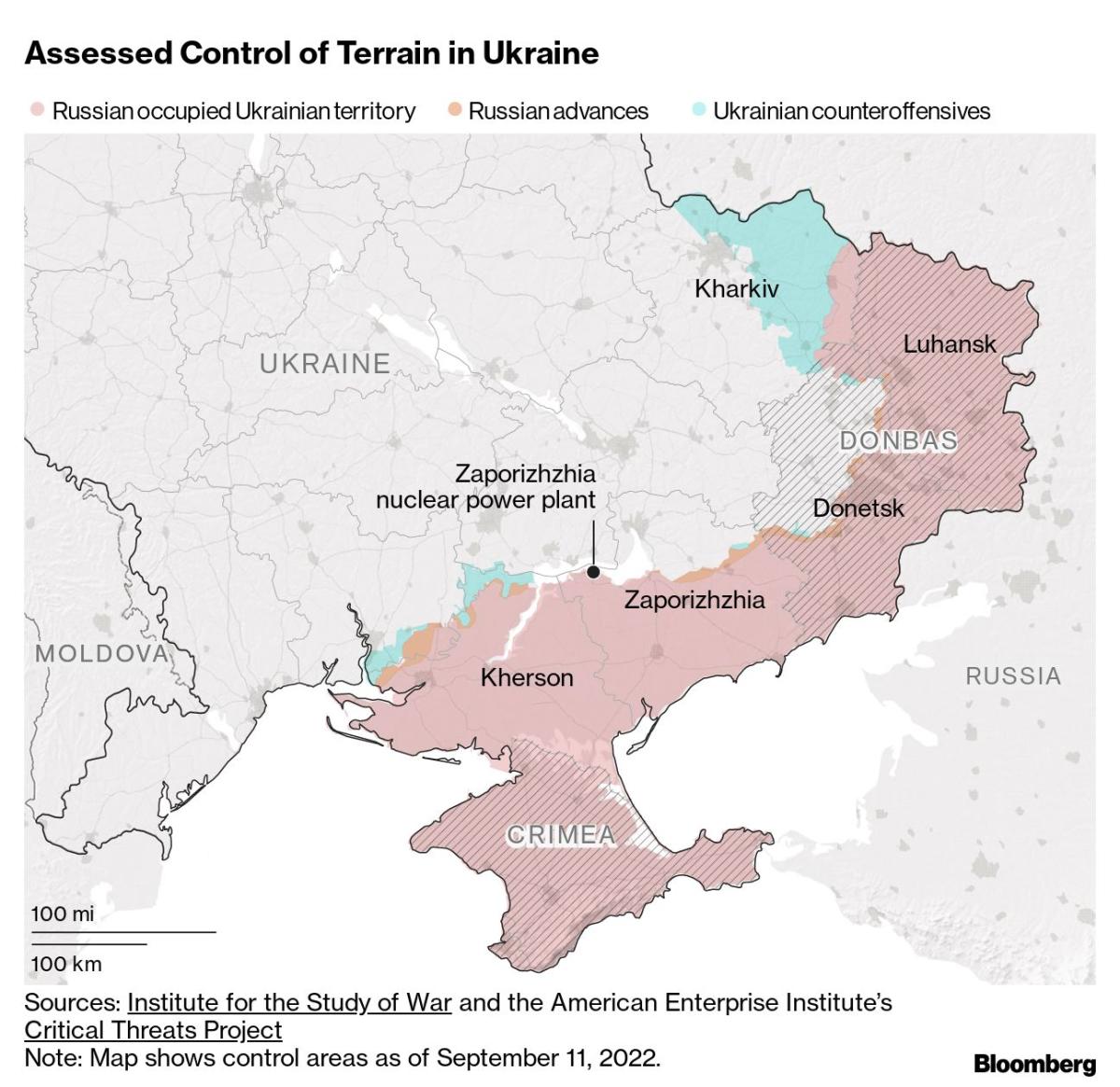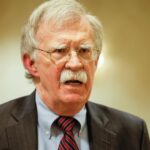
(Bloomberg) — Vladimir Putin will hold bilateral meetings this week with leaders of China, India, Turkey and Iran, the Kremlin said, as the Russian leader seeks to use a summit in Uzbekistan to counter his diplomatic isolation.
Most Read from Bloomberg
Ukrainian forces have recaptured more than 6,000 square kilometers (2,300 square miles) in the east and south of the country so far this month, Ukrainian President Volodymyr Zelenskiy said. Western officials said it’s too early to say whether this is a turning point in the war, with one comparing Ukraine’s recent success to scoring a goal before halftime.
Separately, Armenia accused Azerbaijan of shelling its territory as US Secretary of State Antony Blinken appealed for an end to fighting that threatens to undermine a Russia-brokered cease-fire. The fighting is the latest flare-up in tensions between the two neighboring Caucasus states since thousands were killed in a 44-day war over the disputed territory of Nagorno-Karabakh that was halted in November 2020 when Putin.
(See RSAN on the Bloomberg Terminal for the Russian Sanctions Dashboard.)
Key Developments
-
Ukraine’s Successes Stir Once-Unthinkable Hope of Beating Russia
-
EU Mulls 180-200 Euro Price Cap on Power From Lower-Cost Sources
-
Ukraine’s Richest Man Starts Making Portable Steel War Shelters
-
Oil Chokepoint Off Denmark Gets Caught Up in EU Sanctions
-
Ukraine’s Army Is Winning. Its Economy Is Losing: Niall Ferguson
-
Why Ukraine’s Donbas Region Matters to Putin: QuickTake
On the Ground
Fighting continued in the south, with Ukrainian forces trying to push back Russian troops along the entire front line and prevent their attempts to improve their tactical position, the Ukrainian military said. Russian forces searched for alternative ways to bring up weapons and equipment as Ukraine disrupted their supply lines, the Ukrainian military’s southern command said on Facebook. Ukraine’s General Staff reported that Ukrainian forces repelled Russian attacks near Bakhmut and several other settlements in the Donetsk region. Russian forces are failing to reinforce the new frontline after Ukrainian advances in the Kharkiv region and are actively fleeing the area or moving to other axes, according to the Institute for the Study of War.
(All times CET)
US Mulls Buying Oil at About $80 to Refill Reserves (7:34 p.m.)
The US may begin refilling its emergency oil reserve when crude prices fall to about $80 a barrel, according to people familiar with the matter.
Biden administration officials are weighing the timing of such a move, with an eye toward protecting US oil-production growth and preventing crude prices from plummeting, said the people, who asked not to be named sharing internal deliberations. White House communications staff didn’t immediately respond to a request for comment.
Scholz Tells Putin to Refrain From Further Annexation Moves (6:52 p.m.)
German Chancellor Olaf Scholz spoke to Putin on the phone in a 90-minute conversation. “The Chancellor emphasized that any further Russian annexation steps would not go unanswered and would not be recognized under any circumstances,” German government spokesman Steffen Hebestreit said.
Scholz urged Putin to agree to a diplomatic solution as soon as possible, based on a cease-fire, a complete withdrawal of Russian troops and respect for territorial integrity and sovereignty of Ukraine, Hebestreit said.
Scholz called on the Russian president to treat captured combatants in accordance with the provisions of international humanitarian law, in particular the Geneva Conventions, and to ensure unhindered access for the International Committee of the Red Cross.
Russia Energy Revenue Drops to a 14-Month Low (6:26 p.m.)
Russia’s energy revenues shrank in August to the lowest in more than a year as Western sanctions over Ukraine prompted the Kremlin to sell discounted oil and squeeze gas flows to Europe.
The refusal to buy Russian oil by some traditional customers in Europe means Moscow has been forced to sell oil at a steep discount in Asian markets, depriving it of the full benefit of higher prices. While August saw record-high spot gas prices in Europe, gas levies, which take up a smaller share in the budget, couldn’t fully offset lower oil revenues. State-run Gazprom PJSC has significantly cut gas exports to Europe this summer, blaming sanctions for capped flows.
Russia’s oil and gas revenues, which account for more than a third of nation’s budget, fell to 671.9 billion rubles ($11.1 billion) last month, the lowest since June 2021, according to Finance Ministry’s data published Monday. That’s a drop of almost 13% from July. It’s also a 3.4% decline from a year ago, even though Urals crude prices rose almost 10%.
Putin to Meet Xi, Modi, Erdogan, Iran’s Raisi This Week (4:15 p.m.)
Putin’s meetings with the leaders of China, India, Turkey and Iran will take place Thursday and Friday in Samarkand, where the leaders of the Shanghai Cooperation Organization are holding a regular summit. Chinese President Xi Jinping will be making his first trip outside his country in more than two years.
Dozens of Russian Local Lawmakers Urge Putin to Resign (3 p.m.)
About 50 municipal legislators from various parts of Russia have so far signed an open letter calling on Putin to resign. The petition says the president is “damaging the future of Russia and its citizens.”
One of the co-organizers, Dmitry Baltrukov, said the number of signatories from Moscow, St. Petersburg and other cities has been steadily growing.
Public support for the six-month-old war in Ukraine remains high at 76%, compared to 81% in March, according to the latest poll by the independent Levada Center conducted at the end of August.
Kremlin Warns Nationalist Bloggers on War Criticism (2:15 p.m.)
Kremlin spokesman Dmitry Peskov sent a warning to nationalist bloggers who’ve been growing more critical of the military’s performance in Ukraine. “As long as they remain within the law, that’s pluralism,” Peskov told a conference call. “But the line is very, very fine and one should be quite careful here.”
Since the Feb. 24 invasion, the authorities have allowed widespread commentary on the war effort by nationalist writers who’ve won large followings in Telegram. But as Russian forces have faced setbacks in recent weeks, the writers have openly attacked the military’s handling of the war, often calling for more aggressive tactics.
The Kremlin has shown little tolerance for questioning of the war effort from opponents of the invasion, imposing stiff fines and even jail terms on those who violate a broad new law against “discrediting the military.”
Head of Russia’s Communists Calls ‘Special Operation’ a War (1 p.m.)
Gennady Zyuganov, the head of Russia’s second-biggest political party, said his country was at “war” in Ukraine, becoming the most senior politician to use that term for what the Kremlin refers to as a “special military operation.”
“Over the last two months, the special operation in Ukraine and Donbas turned into a war,” Zyuganov said in comments to journalists at the State Duma that were posted on the Communist party’s website. “Any war requires a response. Above all, it needs the maximum mobilization of forces and resources.”
Putin has so far refused to declare war, which would allow for a general mobilization but could lead to more popular opposition and would be a public recognition of the military setbacks Russia has faced.
Macron, Baltic Leaders Discuss More Military Support (12:30 p.m.)
French President Emmanuel Macron spoke to Estonia’s Kaja Kallas and Lithuania’s Gitanas Nauseda about Ukraine’s military advances. Kallas, the Estonian prime minister, said in a readout of Tuesday’s phone call that the successes show that the Baltics and France have been on the right path in supporting Ukraine. She called for further weapons aid and said European Union visa restrictions on Russian nationals have been effective in putting pressure on Moscow.
The three leaders spoke about further military assistance to Ukraine, the situation at the Zaporizhzhia nuclear plant and potential steps for the EU to resolve the issue of high energy prices, according to a statement from Nauseda’s office.
Ukraine’s War Gains May Let Naftogas Offset Output Drop, CEO Says (12:25 p.m.)
Energy giant Naftogaz Ukrainy may extract a million cubic meters per day or more of natural gas in territories recaptured from Russia during the recent counteroffensive, chief executive officer Yuriy Vitrenko said in an online briefing. This may effectively allow the company to return to the pre-war output level after it dropped 2% this year following Russia’s invasion in February.
Russia Shows No Sign It’s Looking for an Exit, Latvia Says (12:05 p.m.)
Russia shows no sign it wants to end its invasion of Ukraine and lacks the troops and resources to win, meaning fighting should continue at the current level of intensity until the spring, Latvia’s intelligence service said in a report.
The West needs “strategic patience” in continuing to provide arms, training and money to support Ukraine, the intelligence service said. The service assigned a low probability to Putin being replaced, and to Belarus using its armed forces to invade Ukraine. Russia is expected to use covert support for pro-Russian political groups in western countries, cyber attacks and economic leverage to weaken solidarity with Ukraine.
Finland’s Marin Wants Tougher EU Sanctions on Russia (11 a.m.)
European Union countries should impose tougher sanctions on Russia, Finland’s Prime Minister Sanna Marin told lawmakers in the European Parliament on Tuesday. Sanctions should impact the daily lives of ordinary Russians as “it is not right” that Russian tourists travel freely in Europe while the country’s soldiers kill civilians in Ukraine, Marin said.
Marin urged EU states to impose yet tougher visa restrictions on Russians, saying the suspension of a visa facilitation accord was “not a sufficient decision.” The Council of the EU has suspended the 2007 deal that eased the issuing of visas to Russian tourists, meaning higher fees, the need for more documents, an increased processing time, and more restrictive rules for multiple-entry visas.
Mines, Explosives Contaminate Broad Areas in 10 Regions, General Staff Says (9:15 a.m.)
More than 70,000 square kilometers of territory in 10 Ukrainian regions are contaminated with mines and explosives, the General Staff of the Ukrainian Army said on Facebook. The Kharkiv region, most of which was won back by Ukrainian forces this month, is “extremely” affected, more so than Kyiv and Sumy, the Interfax news wire reported citing Interior Minister Denys Monastyrsky.
Kyiv has signed a cooperation memorandum with the HALO Trust, which helps countries clear landmines after conflicts, the Ministry of Reintegration said on its website Monday.
Ukraine Army Liberated 6,000 Square Kilometers: Zelenskiy (8:45 a.m.)
Ukrainian troops are continuing to push forward after liberating over 6,000 square kilometers in eastern and southern Ukraine this month, Zelenskiy said in a statement Monday night.
On Sunday and Monday the Russian army “struck the Ukrainian energy infrastructure” and “hundreds of thousands of Ukrainians found themselves in the dark — without electricity,” Zelenskiy said. This is “a sign of desperation of those who invented this war” and a reaction to Russian defeat in the Kharkiv region, he said, adding that Russia is seeking to cut off Ukraine’s potential to export electricity to Europe. Zelenskiy called for more sanctions and more pressure on Russia.
Zelenskiy to Speak With IMF’s Georgieva on Sept. 13: Reuters (8:35 a.m.)
Zelenskiy will speak with the International Monetary Fund’s Managing Director Kristalina Georgieva on Tuesday, Reuters reported, citing two unidentified people familiar with the matter. The IMF’s executive board discussed Monday a plan to possibly provide Ukraine with 1.4 billion dollars in emergency aid through the fund’s Rapid Financing Instrument.
Most Read from Bloomberg Businessweek
©2022 Bloomberg L.P.




